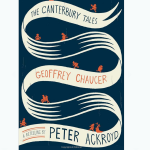Somewhat embarrassingly, I missed reading any of “The Canterbury Tales” during high school and college, so I was very happy when Peter Ackroyd’s version, retelling the stories in modern English prose, made its way into the house. It provided compelling beach reading for two family members before I go t it; as my husband put it, “sex and violence, what could be better?”
t it; as my husband put it, “sex and violence, what could be better?”
And of course he’s right. The Knight’s Tale, for example, is a story of friendship and chivalry (as appropriate for a knight). There’s also a love story, and another of continuing conflict between friends. I now understand the expression the patience of Griselda, whose cringe-inducing martyrdom to her husband is the subject of the Clerk’s Tale. As I read I realized that I had read versions of the stories elsewhere, including the Wife of Bath’s tale, and Chanticleer and the fox from the Nun’s Priest’s Tale.
Despite the occasional striking anachronism (“No way”) Ackroyd’s version shows why these stories and characters till speak to us. Ackroyd is a biographer and historian, and his version has substantial literary merit of its own. One example. The Franklin’s Prologue ends:
Thing that I speke, it moot be bare and pleyn.
I sleep nevere on the Mount of Pernaso,
Ne lerned Marcus Tullius Cithero.
Colours ne knowe I none, withouten drede,
But swiche colors as growen in the mede,
Or elles swich as men dye or peynte.
Colours of rethoryk ben to me queynte.
(The Norton Critical Edition p. 213.) Ackroyd renders those lines as:
Whatever I have to say will have to be plain and simple. I never slept on Mount Parnassus, or studied under Cicero. I know nothing about flourishes or styles. The only colours I know are those of the flowers in the field, or those used by the dyer. I know nothing about chiasmus or oxymoron. Those terms leave me cold.
And in fact, as Ackroyd tells it, the Franklin’s Tale includes a nice chiasmus.
What’s your favorite of Chaucer’s Tales? How do you feel about modernizing and updating the classics? Translations? Discuss in the comments.
Have a book you want me to know about? Email me at asbowie@gmail.com


